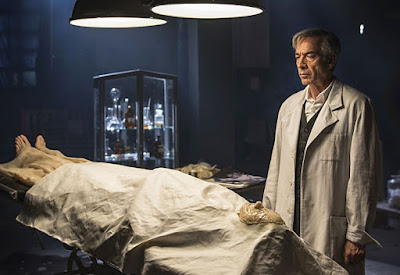In the new and visually ravishing Argentine film, EVA DOESN'T SLEEP, from writer/ director Pablo Agüero (shown at left), Eva is back again. Or at least her corpse is, along with a good deal of history provided by newsreel footage and smartly written and staged drama that places that body front and center. In fact, I don't think we've witnessed a movie in which a corpse took so much part -- physically, emotionally, intellec-tually, politically -- since the terrific little revenge/ thriller sleeper from Spain, The Corpse of Anna Fritz was released earlier this year.
Adhering somewhat closely to fact (and then pulling a full-out fantasia on those facts), Senor Agüero begins by introducing us to a narrator in the midst of stealing Eva's corpse, an Argentine military man from the navy (Gael García Bernal) for whom this woman is everything worthless and slutty and yet who (as she does for just about everyone we meet in the movie) exerts an all-powerful pull nonetheless.
From our Navy man we go to the corpse's Embalmer (Imanol Arias) in the most visually compelling scenes in the film. These combine psychology, politics and beauty to simply amazing ends. We are taken from the height of Perón's early career to 1955, under the military dictatorship, when even the mention of Perón or Eva was forbidden.
From 1969 to to '74, '76 and onward, we meet The Dictator, an all-powerful fellow who, unfortunately for him, has been kidnapped by the rebels and made to give up the whereabouts of the long missing corpse. These scenes rely on tight close-up and some formidable acting skills of the man who plays that Dictator (Daniel Fanego, below), along with those who play his interrogators.
Agüero views all this with a gimlet eye and ear, never more so that when our Dictator hears a radio broadcast about his own death, and the announcer follows this with the words, "And now, back to our afternoon romances on LV10, the voice of freedom."
Eva Perón as symbol has never been made better use of than here, I think. Eva Doesn't Sleep forces us to confront our need for these symbols: How the left wing must endow its leaders with near-magical powers, personalities, goodness and strength until, of course, they end up disappointing us. And how the right wing will ever demonize them as contemptible whores and common dirt. Eva may still be experienced as the heroine of the people, someone who must necessarily go up against the rich and right-wing, not to mention the military and its motto, as that young aide expresses it, "God, the nation, science and sports." But, hey, she's really just another apparition, after all.
From Film Movement and running just 85 minutes, this terrific little movie made its U.S. debut on home video this past week, and is now available on DVD, VOD and streaming via Netflix.









No comments:
Post a Comment